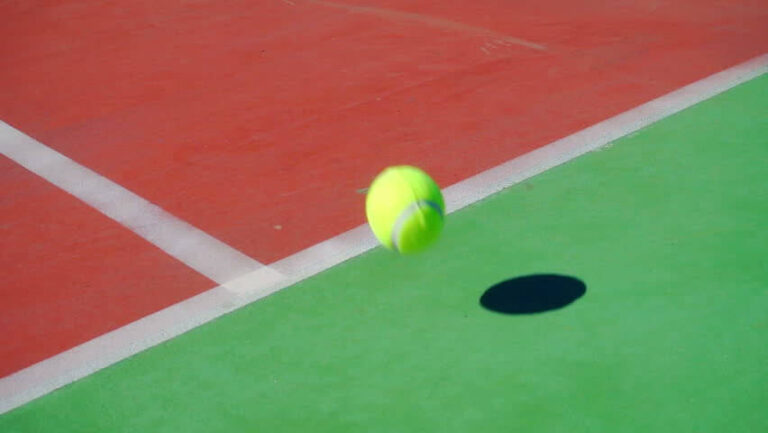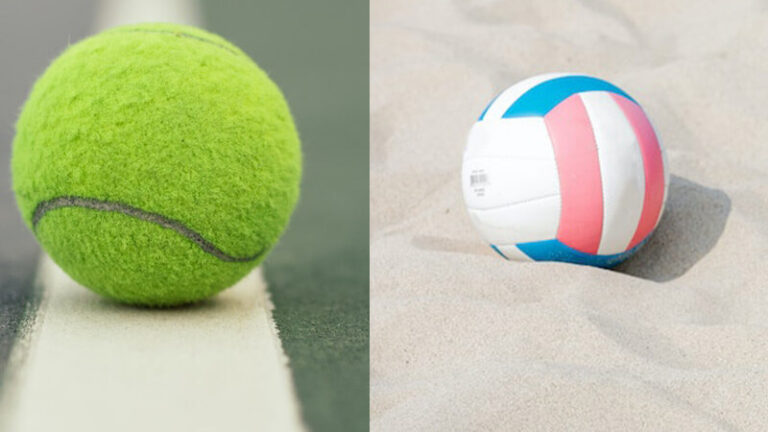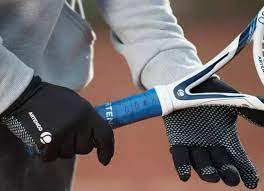Can Tennis Balls Dent Your Car?
A seemingly harmless game of tennis can turn into an expensive ordeal if your car is parked nearby and gets hit by a stray tennis ball. But Can Tennis Balls Dent Your Car?
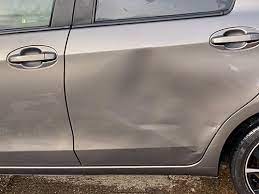
Tennis balls are typically soft felt or rubber balls that average about 68 miles per hour at impact, but can they cause dents in your car? Yes, tennis balls absolutely have the potential to dent your car, especially if they are hit or thrown with enough speed and force.
In this article, I will look at the truth behind this common question and provide insights into the factors that determine whether a tennis ball can actually cause damage to your vehicle.
In addition, I will give you two practical tips on how to protect your car from potential tennis ball hazards and discuss what to do if your vehicle does sustain a dent from a tennis ball.
Can Tennis Balls Dent Your Car?
As I mentioned above, tennis balls can indeed cause dents in your car, especially if they are thrown or hit with a significant amount of force.
Despite their appearance of being soft and harmless, the speed and impact of a tennis ball can generate a substantial amount of force that can result in damage to your vehicle.
The extent of the damage can be even worse if the ball strikes a protruding or recessed part of the car, such as a hood scoop or a wheel well. When a tennis ball hits the metal panel of a car, the impact energy transforms into a force that stretches and alters the metal, resulting in a dent.
Factors – Can Tennis Balls Dent Your Car?
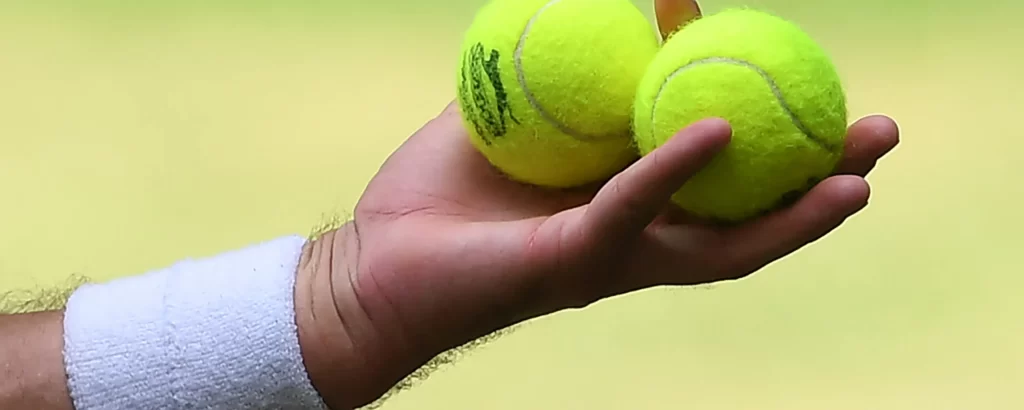
There are a number of factors that can determine whether or not a tennis ball is capable of denting a vehicle, including the following:
- Speed of the ball
- Angle of impact
- Surface of the car
1. Speed of the Ball
The speed at which a tennis ball is traveling can greatly influence its impact force. When a ball is hit at high speed, it carries more kinetic energy, which is transferred upon impact.
This means that a faster ball can exert more force on the car’s surface, increasing the likelihood of a dent. However, it’s worth noting that even a slower-moving ball can dent a car if it hits at the right angle and in a vulnerable spot.
Angle of Impact
The angle at which a tennis ball strikes a car can also be a crucial factor in determining whether a dent occurs. When a ball hits a car at a perpendicular angle, it has a greater chance of causing damage than if it hits at a glancing angle.
This is because a direct hit transfers more energy to the car’s surface, creating a greater impact force. A glancing blow, on the other hand, may not have enough force to cause a dent, especially if it hits a curved or reinforced area of the car.
Surface of the Car
The material and thickness of a car’s surface can also play a role in whether a tennis ball can dent it. Cars with thinner metal panels or those made from lightweight materials like aluminum are more prone to denting from tennis ball impacts. This is because they are less able to absorb the impact force, and the metal is more likely to deform under pressure.
On the other hand, cars with thicker, more rigid panels may be less susceptible to dents from tennis balls.
Misconceptions about Tennis Balls and Car Dents
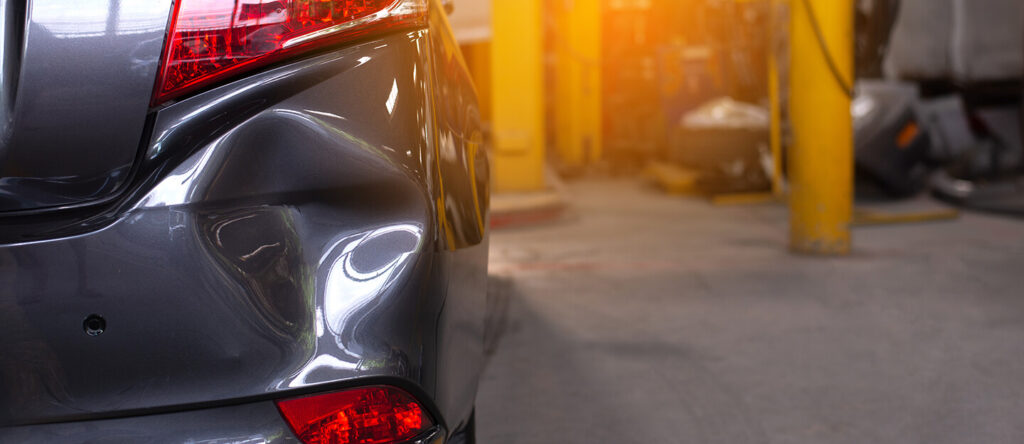
There are several misconceptions about tennis balls and car dents that are worth addressing.
Tennis Balls Are Too Soft To Dent A Car
One common misconception is that tennis balls are too soft and lightweight to cause any damage to a car. While it’s true that tennis balls are not as hard as other objects that could dent a car, such as rocks or metal tools, they can still cause damage under certain circumstances.
As I mentioned earlier, the speed, angle, and surface of the car can all play a role in determining whether a tennis ball can dent a car.
Tennis Balls Can Only Dent A Car If They Are Hit By A Professional Player
Next misconception is that only professional tennis players can hit a tennis ball with enough force to dent a car.
While it’s true that a professional player can generate more speed and force than an amateur player, even a moderate hit can cause a dent if the ball hits at the right angle and on a vulnerable spot.
Tennis Balls Can Only Dent Cars With Thin Metal Surfaces
While it’s true that cars with thinner metal panels are more vulnerable to dents from tennis balls, cars made from other materials like plastic or fiberglass can also be susceptible.
The thickness and rigidity of the car’s surface are important factors in determining its susceptibility to dents.
Even a car with a sturdy metal surface can be dented if the ball hits with enough force and at the right angle.
How to Protect Your Car from Tennis Balls?

Parking Strategies
One of the most effective ways to protect your car from tennis balls is to avoid parking it near tennis courts or other areas where people are likely to be playing sports involving flying objects.
If you’re parking in a public area, try to choose a spot that’s far away from sports activities or areas with heavy pedestrian traffic.
If you’re parking at home, consider creating a designated parking area that’s away from areas where sports are played.
Using Car Covers
Another way to protect your car from tennis balls is to use a high-quality car cover. A car cover can provide an extra layer of protection against potential impacts from tennis balls and other debris, shielding your car’s surface from scratches, dents, and other damage.
When choosing a car cover, look for one that’s specifically designed to protect against impacts from sports equipment, as these tend to be more durable and effective.
What to Do if Your Car Gets Dented by a Tennis Ball?
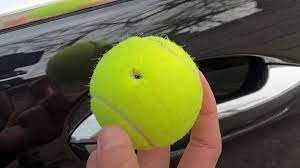
Despite your best efforts, it’s still possible for a tennis ball to dent your car. If this occurs, it’s important to act quickly to minimize further problems and repair the damage.
Assess the Damage
The first step when your car gets dented by a tennis ball is to assess the damage. Determine the size and severity of the dent, as this will influence your approach to repair.
Consider DIY Repair
For minor dents, you may be able to use a DIY paintless dent repair kit to fix the damage. These kits generally come with a collection of specialized tools that let you manipulate the metal back into its original form without the use of paint or filler.
It is essential to keep in mind, however, that repairing dents on your own can be challenging and time-consuming, and it may not be appropriate for all types of dents.
Consult a Professional
If the dent is larger or more complex, it’s best to seek the help of a professional auto body repair shop. A professional technician will have the tools and expertise needed to assess the damage and recommend an appropriate repair solution.
They may also be able to repair the dent using specialized techniques like paintless dent removal, which can be less expensive and time-consuming than traditional repairs.
Check Your Insurance Coverage
It is possible that your insurance policy will cover the cost of repairing the dent, but this will depend on the specifics of your policy. Get in touch with your insurance company so you can learn what your policy covers and the amount of your deductible.
If the cost of repairing the dent is less than your deductible, it may be more cost-effective to pay for the repairs out of pocket rather than filing a claim.
Conclusion
Tennis balls can dent a car depending on various factors such as the speed of the ball, angle of impact, and surface of the car. It is a common misconception that only fast-moving balls or thin metal cars can cause damage.
To protect your car, consider parking strategies and using a high-quality car cover. If your car does get dented, assess the damage and decide whether to repair it yourself or consult a professional.
But before that, check your insurance coverage before filing a claim to determine its cost-effectiveness. If you take these steps, you can minimize damage to your car and address any dents effectively.
Related Posts
How Many Sets Are In Tennis Match?
How Many Tennis Lessons Do I Need? ( About Your Learning Curve )


